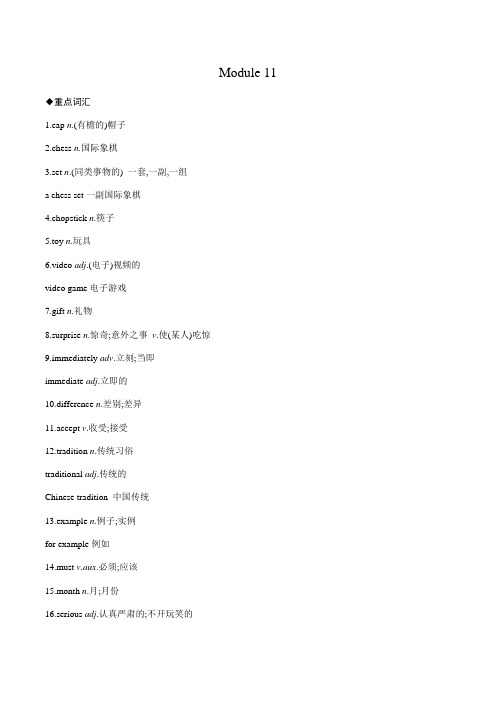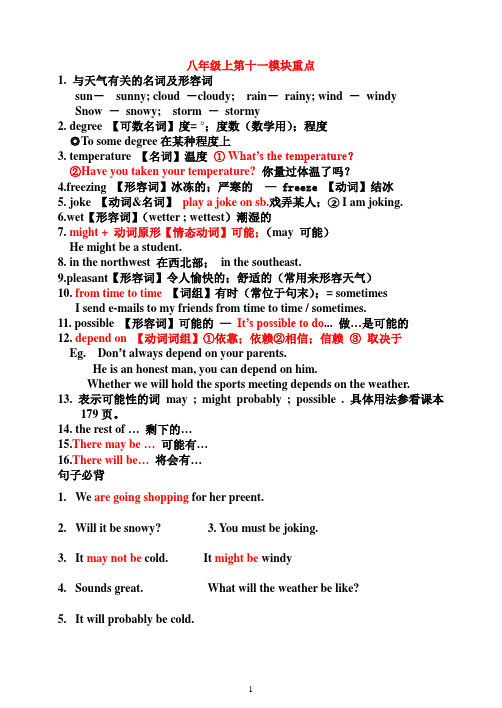外研版 八上Module11 重难点知识梳理
- 格式:docx
- 大小:25.85 KB
- 文档页数:11

初二英语Module 11外研社【本讲教育信息】一. 教学内容:Module 11二. 教学重点、难点:1、熟练准确地掌握本模块的重点词汇与句式2、能正确使用used to 句式和be about to 结构3、语法:use的用法三. use除了“使用”之外,还有下列几个重要短语搭配:(1)used to do sth.过去常常做某事如:We used to go to school together.我们过去常常一起去上学。
(2)used sth. to do…用某物做……如:Chinese like to use chopsticks to have meals.中国人喜欢使用筷子用餐(3)be used to do sth. 被用于做某事如:A pen is used to write.钢笔是用来写字的(4)be used for (doing)sth.被用于(做某事)如:Paper is used for writing on.纸是用来往上写字的。
(5)be used to (doing) sth. 习惯(做)某事如:I’m used to brushing my teeth twice a day.我习惯一天刷两次牙。
used to do, get used to doing的区别He used to be a lawyer. 他过去是个律师。
used to do sth..表示“过去常常做某事”,言外之意就是现在已经不这么做了如:I used to be a very rich villager.We used to help him a lot when he first came here.注意:used to 构成疑问句时可借助于助动词did或直接将used移至主语之前,但后者不常用。
Did you use to see each other?=Used you to see each other?注意:used to 在构成否定时可借助于didn’t, 也可以直接在used后面加not构成,但后者不常用。

Module 11◆重点词汇1.cap n.(有檐的)帽子2.chess n.国际象棋3.set n.(同类事物的) 一套,一副,一组a chess set一副国际象棋4.chopstick n.筷子5.toy n.玩具6.video adj.(电子)视频的video game电子游戏7.gift n.礼物8.surprise n.惊奇;意外之事v.使(某人)吃惊9.immediately adv.立刻;当即immediate adj.立即的10.difference n.差别;差异11.accept v.收受;接受12.tradition n.传统习俗traditional adj.传统的Chinese tradition 中国传统13.example n.例子;实例for example例如14.must v.aux.必须;应该15.month n.月;月份16.serious adj.认真严肃的;不开玩笑的17.taste v.有……的味道n.味道;滋味taste great尝起来美味18.experience n.经历;经验19.stay n.逗留;停留20.someone pron.某人;有人21.sandwich n.三明治;夹心面包片22.gentleman n.先生;男士23.shoulder n.肩;肩膀touch sb.on the shoulder 碰某人的肩膀24.with both hands用双手25.have your hair cut剪发26.something interesting 有趣的事情27.for the first time首次,初次28.a light meal 便餐29.push one’s way 挤30.stand in a line 站成一排31.wait one’s turn 轮流◆重点句型1.What a surprise!多么惊喜啊!2.But in the West,we usually don’t pay much attention to that.但在西方,我们通常不太在意那件事。

Module 11 Way of Life一、重点词组1、多么惊喜呀! What a surprise!2、打扫卫生do some cleaning3、注意pay attention to4、例如for example5、理发have one’s hair cut6、厄运bad luck7、你开不会是说真的吧!You can’t be serious!8、与....不同be different from9、初次for the first time10、商业大街high street11、拍某人的肩膀touch sb. on the shoulder12、挤着前进push your way13、排队stand in line14、等待wait for15、要求某人做某事ask sb to do sth16、在几岁的时候at the age of17、上学迟到be late for school18、在公共场合in public places19、给某人拍照take photos of sb20、脱下,起飞take off21、迫不及待做某事can’t wait to do sth22、熬夜stay up late23、犯错make mistakes二、重点句型1、In China, you accept a gift with both hands. accept a gift with both hands 双手接受礼物accept & receiveaccept 是主观上“接受”receive是客观上“收到”2、I’m interested to know all the Chinese traditions.be interested to do sth对做....感兴趣Interesting & interestedinteresting:有趣的,一般指物很吸引人,容易让人产生兴趣;interested:对...感兴趣,一般指人对某物产生了兴趣。

M11 Way of life 复习单词名词:cap chess set chopstick toy gift difference→(adj)不同的tradition →(adj)传统的example month experience stay sandwich gentleman shoulder westerner(西方人)custom 风俗culture 文化动词:accept receive celebrate(庆祝)形容词:video serious副词:immediately情态动词:must代词:someone兼类词:surprise taste短语1、电子游戏video game2、真是惊喜啊What a surprise3、在西方in the west4、一副国际象棋a chess set5、注意pay attention to6、中国传统习俗the Chinese traditions7、例如for example 8、打扫卫生do some cleaning9、倒霉、厄运bad luck 10、理发have one’s hair cut11、禁止/一定不能做某事mustn’t do sth 12、最好做某事had better do sth13、在……的北方in the north of 14、生活方式way of life15、首次、初次for the first time 16、不仅仅……而且……not just…but…17、喝下午茶have afternoon tea 18、传统食物traditional food19、带走take away 20、挤上公交车push one’s way onto the bus 21、彼此each other 22、站成一排stand in a line23、等着轮到某人wait one’s turn 24、拍某人的肩膀touch sb on the shoulder 25、春节the Spring Festival 26、脱下、起飞take off27、熬夜stay up late 28、炸鱼加薯条fish and chips29、注意到某人做某事notice sb do sth 30. 注意到某人正在做某事notice sb doing sth 句型1、中国人习惯在除夕夜守岁。

M o d ule 11.Way of l i fe一、主题:社会行为/风俗(Soc ial behaviour/custo ms)二、必背单词名词:cap(有檐的)帽子 chess国际象棋se t(同类事物的)(一)套,(一)副,(一)组chopst i ck筷子 toy玩具g i f t礼物 di f fe rence 差别;差异t rad i t ion 传统习俗exa mple例子;实例month 月;月份exper ience 经历;经验 s tay逗留;停留 sandwish三明治;夹心面包片ch ip炸土豆条;炸薯条gent l e man 先生;男士 shou lder肩;肩膀动词:accept收受;接受must必须;应该代词:so meone 某人;有人形容词:v ideo(电子)视频的 serious认真严肃地;不开玩笑的副词:im mediat e ly立即;当即介词:onto 到……之上;向……之上兼类词:surpr i se n.惊奇;意外之事 v.使(某人)吃惊tas te v.有……的味道n.味道;滋味三、常用短语1、a chess se t一副国际象棋2、v ideo ga me 电子游戏3、accept a g i f t接受礼物4、in the West在西方5、Chinese t rad i t i ons中国传统6、for exa mple例如7、do so me c leaning 打扫卫生8、have s th. done 让某人做某事9、the Eng l i sh way o f l i fe英国人的生活方式10、for the f i r s t t i m e 首次;初次11、have a f te rnoon tea喝下午茶12、not jus t…but…不仅………而且………13、tea w i th mi lk 奶茶14、f i sh and ch ips炸鱼加炸薯条15、t rad i t iona l food 传统食物16、push one’s way onto the bus挤上公交车17、stand in a l ine 站成一排18、get on the bus上公交车19、not ice sb. do s th.注意到某人做某事20、touch sb. on the shou lder拍某人的肩膀21、at the age of 在……岁22、on the……s ide of the road 在马路的……边四、重点句型1、表示否定转移的句型:I don’t t hink I shou ld open i t now,2、表示吃惊的句型:(1)W hat a su rp r i se!(2)You can’t be ser ious!3、提出建议的句型:(1)And you mustn’t break anyth ing.(2)And you’d better not haveyour ha i r cut dur ing the Spr ing Fes t i va lm o nth.(3)Let’s ce lebrate L ing l ing’s b i r t hday f i r s t!五、模块语法情态动词 must、can 和 need 的用法(You must say Mr or Mrs when you meet so meone for the f i r s t t ime./You can take i t away./ You needn’t wa i t!)M o d ule 11.W a y of l i fe详细笔记1.Here’s your g i f t.这是给你的礼物。

八年级上第十一模块重点1. 与天气有关的名词及形容词sun-sunny; cloud -cloudy; rain-rainy; wind -windySnow -snowy; storm -stormy2. degree 【可数名词】度= °;度数(数学用);程度◎To some degree在某种程度上3. temperature 【名词】温度①What’s the temperature?②Have you taken your temperature?你量过体温了吗?4.freezing 【形容词】冰冻的;严寒的— freeze 【动词】结冰5. joke 【动词&名词】play a joke on sb.戏弄某人;② I am joking.6.wet【形容词】(wetter ; wettest)潮湿的7. might + 动词原形【情态动词】可能;(may 可能)He might be a student.8. in the northwest 在西北部;in the southeast.9.pleasant【形容词】令人愉快的;舒适的(常用来形容天气)10. from time to time【词组】有时(常位于句末);= sometimesI send e-mails to my friends from time to time / sometimes.11. possible 【形容词】可能的—It’s possible to do... 做…是可能的12. depend on 【动词词组】①依靠;依赖②相信;信赖③取决于Eg. Don’t always depend on your parents.He is an honest man, you can depend on him.Whether we will hold the sports meeting depends on the weather.13. 表示可能性的词may ; might probably ; possible . 具体用法参看课本179页。
外研八上Module 11【重点单词】1、cap n. (有檐的)帽子 ___________ ___________ ___________2、chess n. 国际象棋___________ ___________ ___________3、set n. (同类事物的)(一)套、副、组 ___________ ___________ ___________4、a chess set 一副国际象棋___________ ___________ ___________5、chopsticks n. 筷子___________ ___________ ___________6、toy n. 玩具___________ ___________ ___________7、video adj. (电子)视频的___________ ___________ ___________8、video game 电子游戏___________ ___________ ___________9、gift n. 礼物___________ ___________ ___________10、surprise n. 惊奇;意外之事___________ ___________ ___________V. 使(某人)吃惊 ___________ ___________ ___________11、immediately adv. 立即,立刻___________ ___________ ___________12、difference n. 差异;差别___________ ___________ ___________13、accept v. 收受;接受___________ ___________ ___________14、tradition n. 传统习俗___________ ___________ ___________15、example n. 例子;实例___________ ___________ ___________16、for example 例如___________ ___________ ___________17、must v. aux. 必须;应该___________ ___________ ___________18、month n. 月;月份___________ ___________ ___________19、serious adj. 认真严肃的;不开玩笑的___________ ___________ ___________20、taste v. 有…..的味道;n. 味道;滋味___________ ___________ ___________21、experience n. 经验;经历___________ ___________ ___________22、stay n. 逗留;停留___________ ___________ ___________23、someone pron. 某人;有人___________ ___________ ___________24、for the first time 首次;初次___________ ___________ ___________25、sandwich n. 三明治;夹心面包___________ ___________ ___________26、chip n. 炸土豆条;炸薯条___________ ___________ ___________27、fish and chips 炸鱼加炸薯条___________ ___________ ___________28、onto prep. 在…之上;向……之上___________ ___________ ___________29、gentleman n . 先生;男士___________ ___________ ___________30、shoulder n. 肩,肩膀___________ ___________ ___________ 【重点词组】1. a chess set 一副国际象棋2. video game 电子游戏3. do some cleaning 打扫卫生4. bad luck 倒霉5. the Spring Festival 春节6. get married 结婚7. for example 例如8. for the first time 首次;初次9. shake hands 握手10. have afternoon tea 喝下午茶11. light meal 便餐;便饭12. be different from 与……不同13. each other 互相14. look up 查寻15. at the age of 在……岁时16. clean up 打扫干净17. wash up 洗刷;饭后洗餐具18. stay out 待在户外;不回家19. can't wait to do sth. 迫不及待做某事20. make mistakes 犯错;出错21.tell me more 说得更多点22.not just...but (also) 不仅...而且23.push one’s way推挤24.stand in a line =wait in a line 排队25.touch sb. on the shoulder 碰某人肩膀 =touch one’s shoulder26.have one’s hair cut理发【重点句型】1. What a surprise! 多么惊喜啊!2. And you mustn’t break anything. It’s bad luck. 并且,你千万别打破东西,这不吉利。
Module 11【重点单词】1.cap[kæp]n.(有檐的)帽子2.chess[tʃes]n.国际象棋3.set [set]n.(同类事物的)(一)套,(一)副,(一)组4.chopstick['tʃɒpˌstɪk]n.筷子5.toy[tɔɪ] n.玩具6.video ['vɪdɪəʊ]adj.(电子)视频的7.gift [gɪft] n.礼物8.surprise[sə'praɪz]n.惊奇;意外之事v.使(某人)吃惊9.immediately[ɪ'miːdiətli]adv.立刻;当即10.difference['dɪfərəns]n.差别;差异11.accept[ək'sept]v.收受;接受12.tradition[trə'dɪʃən]n.传统习俗13.example[ɪg'zɑːmpl]n.例子;实例14.must[mʌst;məst] aux.必须;应该15.month[mʌnθ]n.月;月份16.serious['sɪəriəs]adj.认真严肃的;不开玩笑的17.taste[teɪst]v.有……的味道n.味道;滋味18.experience[ɪk'spɪəriəns]n.经历;经验19.stay [steɪ]n.逗留;停留20.someone ['sʌmwʌn]pron.某人;有人21.sandwich['sændwɪdʒ]n.三明治;夹心面包片22.chip [tʃɪp]n.炸土豆条;炸薯条23.onto ['ɒntə] prep.到……之上;向……之上24.gentleman['dʒentlmən]n.先生;男士25.shoulder ['ʃəʊldə] n.肩;肩膀【重点短语】1. a chess set 一副国际象棋2. video game电子游戏3. do some cleaning 打扫卫生4. bad luck 坏运气5. the Spring Festival 春节6. get married 结婚7. for example 例如8. for the first time 首次;初次9. shake hands 握手10. have afternoon tea 喝下午茶11. light meal 便餐;便饭12. be different from 与……不同13. each other 互相14. on time 准时;按时15. look up 查寻16. at the age of 在……岁时17. clean up 打扫干净18. wash up 洗刷;饭后洗餐具19. stay out 待在户外;不回家20. can’t wait to do sth. 迫不及待做某事21. make mistakes 犯错;出错【重点句型】1.What a surprise!多么惊喜啊!2. And you mustn’t break anything. It’s bad luck.并且,你千万别打破东西,这不吉利。
Module11 单元必考知识点1. 形容词的比拟级和最高级的用法。
透视:形容词的比拟级用于两者之间的比拟,而形容词的最高级是用于三者以上的比拟,它们都有各自的句型,我们需要记住和掌握。
考题:1) English is one if ______ important subjects in our school.A. mostB. the mostC. moreD. much more解读:这里是形容词最高级的一个句型:be+one of+the+形容词的最高级+名词的复数,意为“是最…之一〞,所以应该选B. the most。
2) —This sweater is too exp ensive. I can’t afford it.—How about this one?I t’s much ______.A. cheapB. cheaperC. cheapestD. the cheapest 解读:根据第一句来判断,是两者的比拟,所以应该用比拟级,因此选B. cheaper。
2. It用作形式主语。
透视:,it是形式主语,真正的主是后面的动词不定式,如:It is important for you to remember the words. 对你来说记住这些单词是重要的。
有时也可以把动词不定式放在句首。
考题:Jim wants t o be a musician, so it’s important for him _____ the piano well.A. playB. to playC. playing解读:此题就是考察动词不定式的这种用法,所以应该选B. to play。
3. forget,remember的用法。
透视:forget意为“忘记〞,remember是它的反义词,意为“记得,记起〞,它们的后面可以跟动词不定式和-ing形式,但是其意义却不一样。
加动词不定式表示事情还没有做,加-ing表示事情已经做了。